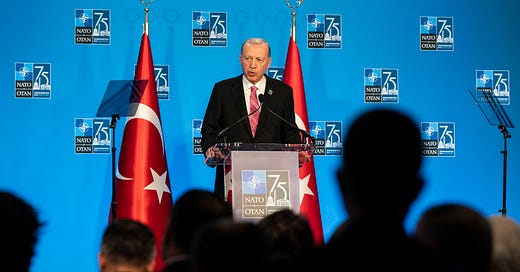Why emboldened Erdoğan has arrested his Turkish presidential rival
With allies in control of Damascus, and with little prospect of a backlash from Washington, Erdoğan has moved to pre-empt a potential challenge and reassert his power.
The Turkish president, Recep Tayyip Erdoğan, has launched a new wave of repression in an effort to reassert his control over Turkey and sideline political challengers. His main target is none other than Istanbul’s charismatic mayor, Ekrem İmamoğlu, who has been detained by the Turkish police on charges of corruption and aiding terrorism. According to İmamoğlu’s wife, the police arrived at the mayor’s house at dawn, and later took him away for questioning.
This move, widely interpreted as a pre-emptive strike against a powerful political rival, has been denounced by the chairman of Turkey’s main opposition party, the Republican People’s Party (CHP), as “an attempt at a coup against our next president”.
In addition to this show of force, the police have issued arrest warrants for 99 others, and the Turkish government has also begun to throttle access to social media sites such as X, TikTok, Instagram and YouTube. It’s a suite of measures reminiscent of Erdoğan’s previous clampdowns on dissent in the wake of the 2013 Gezi Park protests or the attempted coup d’état of 2016.
The ground for the crackdown on Istanbul’s mayor has been prepared by months of state-sponsored lawfare targeting opposition figures around the country. And yesterday, in an ominous warning of today’s manoeuvre, Istanbul University rescinded İmamoğlu’s degree, likely under pressure from the government. Since candidates running for the Turkish presidency must possess a higher education degree, rescinding İmamoğlu’s would disqualify him from entering the next presidential race.
Now, the state-run Anadolu news agency has announced that separate legal investigations have been launched into İmamoğlu’s conduct. One probe alleges that the mayor’s 2024 re-election campaign received support from the outlawed Kurdistan Workers’ Party (PKK), which is officially designated as a terrorism organisation by Turkey, the United States, the United Kingdom and the European Union.
Another probe accuses Istanbul’s mayor of financial irregularities and corruption in the awarding of public tenders. İmamoğlu and his supporters deny all such allegations as a blatant attempt to smear and discredit President Erdoğan’s chief rival. They point out that Erdoğan has frequently used the pretext of corruption charges to dismantle potential challengers for power – including figures in the army – over the last decade and a half.
A charismatic politician with a broad popular appeal, the 54-year-old İmamoğlu has emerged as a serious political force for Turks opposed to Erdoğan’s government. In 2019, he inflicted a major upset on Erdoğan’s governing Justice and Development Party (AKP) by winning the 2019 mayoral race in Istanbul, an event that challenged the party’s grip on the city for the first time since the AKP won power there in 2004. He repeated this act in 2024, winning a second mandate as mayor.
This success has put a target on İmamoğlu’s back. Added to the threat posed by the mayor to Erdoğan personally is a far deeper historical enmity between the Islamist-influenced AKP and the CHP, which traces its origins back to the secularism of Turkey’s founder, Mustafa Kemal Atatürk.
Why has the Turkish president chosen this moment to strike against his opponents? Erdoğan’s anxiety might have been inflamed by recent opinion surveys. Some recent polls have suggested that the CHP now enjoys a very slight lead over the AKP. If İmamoğlu were to run in the presidential elections scheduled for 2028, he might just be able to unseat Erdoğan.
However, it seems likely that there are broader geopolitical factors underpinning today’s manoeuvres. President Erdoğan has been emboldened by the spectacular collapse of the Assad regime in Syria, and the corresponding rise of Hay’at Tahrir al-Sham (HTS) to power. The Islamist group has close ties with Turkey’s government, as evidenced by the Turkish foreign minister Hakan Fidan’s frequent travels to the Syrian capital since the fall of Assad in December.
Then there is the Trump factor. Like most strongmen, Erdoğan excels in flattering the American president’s ego, and perhaps has drawn the conclusion that Trump, unlike his predecessors, will not care a jot about what he gets up to in his own back yard, so long as it doesn’t harm American interests. In contrast to President Obama’s criticisms of the heavy repression that followed the 2016 attempted coup, any response from the White House today is likely to be muted.
With allies in control of Damascus, and with little prospect of a backlash from Washington, Erdoğan has acted to pre-empt a potential challenge and reassert his power.
Erdoğan’s heavy handed tactics will raise awkward questions in European capitals about how to approach Turkey. After Trump has revealed his willingness to cultivate a rapprochement with Russia, Europe’s leaders have been busy trying to make sure that defence and diplomatic ties with Turkey, a major NATO power, remain close.
By far the greater difficulties, however, are those faced by Erdoğan himself. The Turkish lira fell 5% against the dollar in response to the president’s crackdown. A selloff of the Turkish lira, moreover, could have wider repercussions that ripple throughout emerging markets, particularly while the US-China tariff war continues to escalate.
There is also a sense of history repeating itself. In the late 1990s, Erdoğan himself was mayor of Istanbul and emerged as a popular political insurgent taking on Turkey’s Kemalist establishment. In 1998, he was slammed in prison on the flimsiest of pretexts, after reciting verses from the Turkish nationalist poet Ziya Gökalp. It was the making of him as a politician, and he rode his reputation as the persecuted champion of Turks opposed to an unjust government all the way to power.
If Erdoğan is not careful, this could easily happen again. Unleashing such blatant repression could turn İmamoğlu into a political martyr, and allow him to emerge as an even more powerful figure than before.




